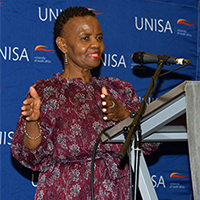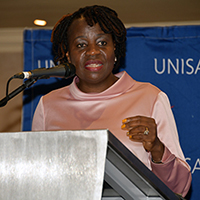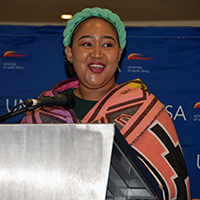Alumni
An alumni event fit for queens

Moipone Masalesa
The women of Unisa’s Ekurhuleni Alumni Chapter recently celebrated Women's Month with an intriguing programme with renowned speakers who came to motivate and encourage one another. To help celebrate the day was Moipone Masalesa, Unisa's Gauteng Region’s Director. Being one of Unisa’s largest regions, Masalesa shared the Gauteng Region's highlights.
Elsie Pule, Group Executive of Human Resources at Eskom Holdings SOC Ltd and recipient of the 2018 Standard Bank Top Woman in Government Award, addressed the alumni about the advancement of women.
She explained that her journey began in 1995 with Eskom as her first employer. Most importantly, her journey enabled her to learn the intricacies of having women employees in the workplace. She learned it through the women's advancement programme that she helped establish at Eskom. According to Pule, the programme was established to ensure that the work environment was ready for women and that it was where they could strive and advance themselves.
However, Pule said that women have always occupied a cultural role, which has evolved significantly over the years. She said: "This was marked by the political stance that women took in 1956 when they marched to the Union Buildings against the introduction of pass laws for black women." She added: "This showed that women could do much when they support each other. Women must see each other not as competitors, but as allies and break the moulds of denigrating each other."
"The term wathint' abafazi, wathint' imbokodo represents courage and strength for women in South Africa," remarked Pule. She encouraged women to work together and have conversations with men to make them understand the advancement of women.

Elsie Pule |

Her Majesty Queen Sekhothali Mabhena of the amaNdebele Kingdom |
The keynote speaker, Her Majesty Queen Sekhothali Mabhena of the amaNdebele Kingdom, spoke about women empowerment post Covid-19. The Queen is a champion and an activist of ending child marriages, female genital mutilation (FGM), and sexual and women abuse. She also contributes extensively in the areas of sexual reproductive health.
In an emotional address, Mabhena gave insight into the cultural practices and the harm done daily to women and children, including boys. She unpacked the state of FGM in the country, especially in provinces such as the Eastern Cape and the Free State, where it is still prevalent. She explained that girls in these areas are married at a young age to alleviate poverty in their homes.
She affirmed: "FGM has been a mentally and emotionally strenuous journey for me as we all know that everything we have in our vaginal area is there for a purpose. So, if anything is removed, what quality of life do you want your girl child to have?" Mabhena acknowledged that it has been challenging to teach women and mothers in rural areas about the impact that FGM has on girl children. Very often, activists are met with hostility. "We get criticised, shot at and thrown with stones by people who do not want us to interfere with the process," she attested.
She added that about 65% of the children that go through FGM die during the process. "Some live with unmanageable infections and without vital organs like bladders, and cannot get married as they are viewed as damaged goods. This, in turn, leads to rejection by families and to possible prostitution by victims,” said Mabhena.
She noted that many cultural practices have proven difficult to break. "For example," she continued, "many cultures on the African continent do not permit women to address issues with men. How else can we protect the girl child if we cannot speak up?"
In this regard, Mabhena recommends the mentoring of boy children as highly vital. "Without them getting the knowledge they need; we are as good as raising our enemies. It is time for us to teach our children to move in a different direction," she concluded.
The programme ended on a high note as women received beautiful gifts and were pampered by sponsors: Luc Mo Wines with their African Royals range, the Peermont Hotel Group, the Champagne Sports Resort in the Drakensberg, OohDee Luxury, The Blend Wellness, Thaluki Nkgoeng and Cell C.
* By Busisiwe Mahlangu, Communication Coordinator, Unisa Foundation and Alumni Relations
Publish date: 2022/08/25

 Unisa co-hosts G20 community outreach in the Eastern Cape
Unisa co-hosts G20 community outreach in the Eastern Cape
 Unisans gain membership of prestigious science academies
Unisans gain membership of prestigious science academies
 Advocating for disability transformation through servant leadership
Advocating for disability transformation through servant leadership
 Unisa Press continues to illuminate the publishing space
Unisa Press continues to illuminate the publishing space